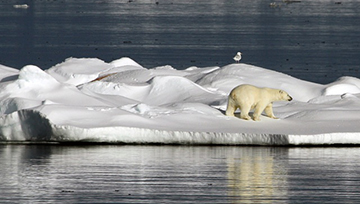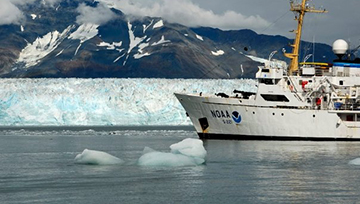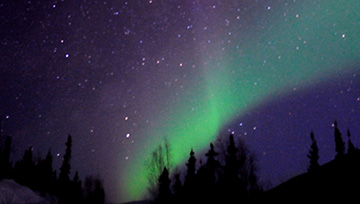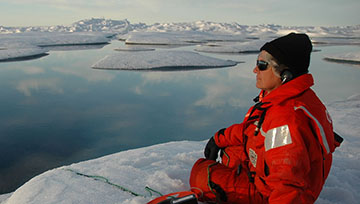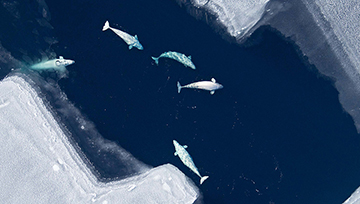The Distributed Biological Observatory (DBO)-Northern Chukchi Integrated Study (NCIS):
Hydrography, Sediment, and Macrofaunal Population Dynamics
Vessel: USCGC Healy; Expedition Dates: October 01, 2017-September 30, 2018; Ports: Seward, AK to Seward, AK
Project Principals: Jackie Grebmeier
Project Co-Principal: Lee Cooper
PI Institution(s): University of Maryland Center for Environmental Science (UMCES)
Partnerships: PMEL, JAMSTEC, NSF, NASA
Grant #: NA20OAR4320271; Award Period: 01 October 2017 – 30 September 2018
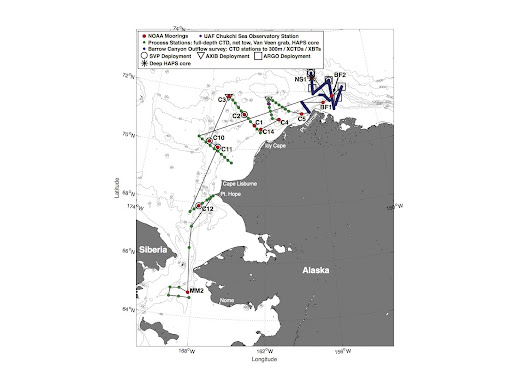 The overall goal of our component of the Distributed Biological Observatory (DBO)/Northern Chukchi Integrated Study (NCIS) project over the annual period of this report was to determine hydrographic and sediment characteristics that influence macrofaunal communities that live in the sediments and ecosystem function in the northern Bering and Chukchi Seas. Specifically, we are evaluating status and trends using a time series approach. During the 2017-2018 period we processed samples from the 2017 cruise collected on the US Coast Guard Cutter Healy 17-02 cruise (August 26-September 15, 2017), which included (1) sampling on time-series DBO transect lines DBO1 and DBO 3-5 for water column and sediment parameters, (2) water column oxygen-18 measurements in seawater as a sea ice melt tracer, and (3) macrofaunal and sediment process studies on a latitudinal basis to track benthic ecosystem response to earlier sea ice retreat and seawater warming. In addition, the 2018 sampling occurred August 7-24, 2018 on the USCGC Healy (HLY1801) and followed similar sampling activities as in 2017, although we occupied DBO 2 instead of DBO1, along with DBO3-5, then focused on a water column study of the Chukchi Sea slope to basin region. We undertook our studies in concert with other DBO-NCIS investigators that are facilitating an evaluation of the key processes influencing the overall trophic structure and driving factors of the Pacific Arctic ecosystem. These interdisciplinary investigations are addressing variability and forcing functions in the diverse water masses and benthic habitat types that are now subject to significantly longer sea-ice free periods and increasing seasonal seawater temperatures. The field program sampled the diverse water masses and benthic habitat types that are now subject to significantly longer open water periods as seasonal sea ice has declined and seawater warms seasonally.
The overall goal of our component of the Distributed Biological Observatory (DBO)/Northern Chukchi Integrated Study (NCIS) project over the annual period of this report was to determine hydrographic and sediment characteristics that influence macrofaunal communities that live in the sediments and ecosystem function in the northern Bering and Chukchi Seas. Specifically, we are evaluating status and trends using a time series approach. During the 2017-2018 period we processed samples from the 2017 cruise collected on the US Coast Guard Cutter Healy 17-02 cruise (August 26-September 15, 2017), which included (1) sampling on time-series DBO transect lines DBO1 and DBO 3-5 for water column and sediment parameters, (2) water column oxygen-18 measurements in seawater as a sea ice melt tracer, and (3) macrofaunal and sediment process studies on a latitudinal basis to track benthic ecosystem response to earlier sea ice retreat and seawater warming. In addition, the 2018 sampling occurred August 7-24, 2018 on the USCGC Healy (HLY1801) and followed similar sampling activities as in 2017, although we occupied DBO 2 instead of DBO1, along with DBO3-5, then focused on a water column study of the Chukchi Sea slope to basin region. We undertook our studies in concert with other DBO-NCIS investigators that are facilitating an evaluation of the key processes influencing the overall trophic structure and driving factors of the Pacific Arctic ecosystem. These interdisciplinary investigations are addressing variability and forcing functions in the diverse water masses and benthic habitat types that are now subject to significantly longer sea-ice free periods and increasing seasonal seawater temperatures. The field program sampled the diverse water masses and benthic habitat types that are now subject to significantly longer open water periods as seasonal sea ice has declined and seawater warms seasonally.
Project Datasets
ADCP (Acoustic Doppler Current Profiler) | Access Link |
CTD (Conductivity, Temperature, Depth) | Access Link |
Water Column Oxygen Isotopes | Access Link |
Benthic Environmental Data | Access Link |
Macrofaunal Invertebrate Abundance | Access Link |
Processed Project Datasets
Multiple (Bundled data product) | Access Link |
Products and Codes
CTD Processing Code | Access Link |
Gridded Products | Access Link |
Additional Resources
DBO Project Website | Access Link |
Pacific Arctic Group Website | Access Link |
Publications
Cooper, L.W., and J.M. Grebmeier. 2018. Deposition patterns on the Chukchi Shelf using radionuclide inventories in relation to sediment characteristics. Deep-sea Research II Topical Studies in Oceanography 152, 48-66. | Access Link |
Frey, K.E, Comiso, L.W. Cooper, L.B. Eisner, R.R. Gradinger, J.M. Grebmeier, and J.-É Tremblay. 2017. Arctic Ocean Primary Productivity. In: Arctic Report Card 2017, NOAA, http://www.arctic.noaa.gov/Report-Card/Report-Card-2017/ArtMID/7798/ArticleID/701/Arctic-Ocean-Primary-Productivity. | Access Link |
Goethel, C.L., J.M. Grebmeier, L.W. Cooper, and T.J. Miller. 2017. Implications of ocean acidification in the Pacific Arctic: Experimental responses of three Arctic bivalves to decreased pH and food availability. Deep Sea Research Part II Topical Studies in Oceanography, 144, 112-124. | Access Link |
Grebmeier, J.M, K.E. Frey, L.W. Cooper, and M. Kędra. 2018. Trends in benthic macrofaunal populations, seasonal sea ice persistence and bottom water temperatures in the Bering Strait region. Oceanography, 31(2), 136–151; https://doi.org/10.5670/oceanog.2018.224. | Access Link |
Hauri, C., S.L. Danielson, A.M.P McDonnell, R.R. Hopcroft, P. Winsor, P. Shipton, C. Lalande, K.M. Stafford, J.K. Horne, L.W. Cooper, J.M. Grebmeier, A. Mahoney, K. Maisch, M. McCammon, H. Statscewich, A. Sybrandy, and T. Weingartner. 2018. From sea ice to seals: A moored marine ecosystem observatory in the Arctic. Ocean Science 14, 1423–1433; https://doi.org/10.5194/os-14-1423-2018. | Access Link |
Moore, S.E., and J.M. Grebmeier. 2018. The Distributed Biological Observatory: Linking Physics to Biology in the Pacific Arctic Region. Arctic, 71 Suppl (5), 1-7; | Access Link |
Moore, S.E., P.J. Stabeno, J.M. Grebmeier, and S.R. Okkonen. 2018. The Arctic Marine Pulses model: linking annual oceanographic processes to contiguous ecological domains in the Pacific Arctic. Deep Sea Research II Topical Studies in Oceanography 152, 8-21. | Access Link |
Danielson, S.L., K. Iken, C. Hauri, R.R. Hopcroft, P. Winsor, C. Lalande, L.W. Cooper, J.M. Grebmeier, J.K. Horne, and K.M. Stafford. 2018. Collaborative approaches to multi-disciplinary monitoring of the Chukchi shelf marine ecosystem: Networks of networks for maintaining long-term Arctic observations. Proceedings of the Marine Technology Society and IEEE Ocean Engineering Society, Oceans 17, Anchorage, Alaska | Access Link |
Iken, K., F. Mueter, J.M. Grebmeier, L.W. Cooper, S. Danielson, and B. Bluhm. 2018. Developing an observational design for epibenthos and fish assemblages in the Chukchi Sea. Deep-Sea Research II Topical Studies in Oceanography (in press), https://doi.org/10.1016/j.dsr2.2018.11.005 | Access Link |
Data Citation
Grebmeier, J.M, L.W. Cooper. (2018). Environmental data and products from NOAA GOMO-Arctic Research Program Award #NA20OAR4320271, Project: The Distributed Biological Observatory (DBO)-Northern Chukchi Integrated Study (NCIS): Hydrography, Sediment, and Macrofaunal Population Dynamics. [Indicate subset used]. NOAA National Centers for Environmental Information. Project Datasets. https://. Accessed: [date]. | Access Link |

